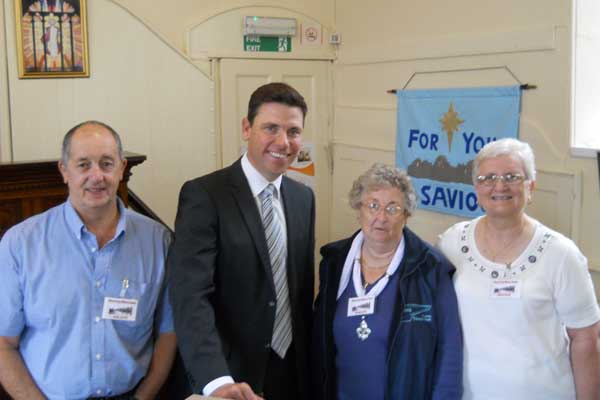
More should be done to promote first-hand spoken history records, Islwyn MP Chris Evans has argued.
The history of the South Wales Valleys, from the experiences of striking miners to the decline of the coal industry, has regularly been passed on through word of mouth.
However, after giving a lecture to the Fleur-de-Lys history society on former Merthyr MP SO Davies, Mr Evans has warned that these stories risk being lost forever if the memories and experiences of older generations are not recorded.
Speaking after the lecture, Mr Evans said: “When researching or reading about history our first stop is often old documents or history books.
“However, these tend to focus on political giants and world changing events, missing out the stories of people who lived through different times and experienced historical events first hand.
“Oral history gives us a chance to capture the personal stories of ordinary people and provide us with a different perspective on our past.
“If everybody took an hour to sit down with a tape recorder and speak to an older family member, neighbour or friend, we can give younger generations the opportunity to re-live our history and discover their heritage.”

As chairman of Caerphilly Local History Society I agree with Chris Evans MP that the experiences of those at the 'sharp end' of history are often lost and oral history has a part to play in preserving the historical record. These experiences are termed 'primary sources' and are extremely important for the research of historians in the future.
There is a problem, however, the technology of recording speech advances so rapidly that it is sometimes difficult to retrieve the information. As an example in the 1960's reel to reel tape was often used. How many of us could replay these tapes now? There is also a problem with the recording medium degrading, especially if stored incorrectly, which also results in information being lost forever.
A far better way is to preserve a written record that can be easily duplicated and stored as a paper copy which is capable of lasting for hundreds of years and is retrievable. The solution to the problem is to record the stories of those who are unable or unwilling to commit their memories to print and then to make a ‘hard copy’. This written account can then be properly preserved at the Glamorgan Archive, Cardiff, a purpose built repository of our history. Currently, I believe, the Glamorgan Archive does not accept recorded voices but is pleased to receive written accounts.
I do not wish to discourage people from making recordings of oral history, far from it, but they should be aware that this presents difficulties, as I have outlined. If a voice recording is made it will stand a far better chance of survival if transcribed into print. If this is not possible the sound archive at the National Library of Wales does accept sound recordings.
If anybody is interested in recording the history of Caerphilly and district, but are unsure of the best way to do it, The Caerphilly Local History Society has been in existence for more than half a century and can offer free advice. Our E-mail is,
info@caerphillylocalhistorysociety.co.uk.
In other words,keep buying newspapers. Even if it is the Western Mail. What a pity the South Wales Daily News is gone and we've got to buy a Tory rag …
I'm in New Zealand and will be coming over to Caerphilly mid 2013 to learn more about my own family history. My grandfather, William Corbett a miner at Bewas, suffered severe depression and in 1332 was executed for murdering my grandmother, Ethel Corbett. Since my father's death in 2004 I've learned a lot of details about this sad event that evidently shook the town. I will be bringing my father's ashes with me so that he can be returned to the homeland he loved so much. Would anyone be interested to learn more?
Oops, it was 1931: http://www.britishexecutions.co.uk/execution-cont…